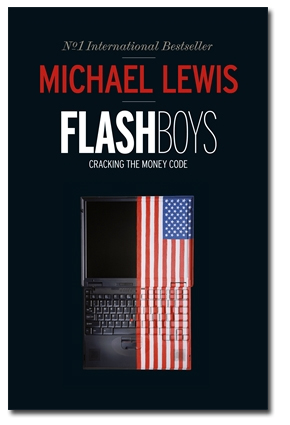Flash Boys, book review: Exposing the Wall Street shuffle


Whatever benefits computers have brought us, it's not clear that they've improved the financial markets. There, automation has brought us volatility, incomprehensible products, confusion and, Michael Lewis writes in Flash Boys: Cracking the Money Code, institutionalised rip-offs.
The path that led Lewis to this book started with a single question: what was Sergey Aleynikov's job? A Russian programmer, Aleynikov was the only Goldman Sachs employee arrested, convicted and sent to jail after the 2008 crash. What was a 'high-frequency trading programmer'? Why did Goldman Sachs call the FBI when he left in 2009, having taken copies of some of his computer code? Eventually, Lewis found himself talking to a bunch of guys from all corners of Wall Street who are trying to force the markets into honesty and fairness. The thing they built is IEX, a new trading venue owned by a consortium of investors.
The story begins in the October 1987 the stock market crash, when brokers, wanting to avoid customers' sell orders, didn't pick up their phones. Regulators responded by changing the rules to enable customers to connect directly to computers. Gradually, the computers have replaced all the people, so you are now hopelessly outdated if you still envision the trading floor as a bunch of guys shouting and waving slips of paper at each other.
The stock market has, in fact, become a black box. Keep this in mind if you're inclined to say, 'Why not?' to electronic voting.
Physics and chicanery
Lewis's story is one of physics and chicanery. He begins with Spread Networks, whose founder, Dan Spivey, set out in 2009 to build the most direct fibre connection possible between Chicago and New York. That's the physics part, and it's simple: every extra inch your buy and sell orders travel costs you time, which is money to high-frequency traders. If you're moving in and out of positions thousands of times a day, latency during which the market might move is the enemy.
Fair markets depend on openness and transparency to keep them honest. Instead, the big banks and brokers have been allowed to create 'dark pools' — private trading areas closed to the public.
Like Lewis, Brad Katsuyama, then at the Royal Bank of Canada and now head of IEX, began with one question: why did the prices he saw on his monitor shift when he placed a large order that couldn't be fulfilled on a single exchange? The answer turned out to be that high-frequency traders were leveraging the different lengths of time it took for orders to reach the various exchanges by buying or selling the shares before his order arrived at all but the first one. It's exactly as if you were courtside at a tennis match and used the second or two between the end of each point and the official announcement of the score to bet by mobile phone on the point's outcome: it's betting on a sure thing.
Fair markets depend on openness and transparency to keep them honest. Instead, the big banks and brokers have been allowed to create 'dark pools' — private trading areas closed to the public. The scam works something like this: a big customer wants to buy, say, 100,000 BP shares at up to a given price. The broker, instead of routing the order to the market at large and accepting the best offers, might instead fill the order from someone inside its dark pool, actually sourcing the shares from the public market at a lower price. But who can tell?
It would be nice to think that all this is a purely American problem but, as Lewis writes, the techniques in use in the US have been widely exported and copied. Regulators can patch the rules, but Wall Street has a long history of finding new loopholes. So: IEX, to change the game. Now it's up to investors to demand its use.